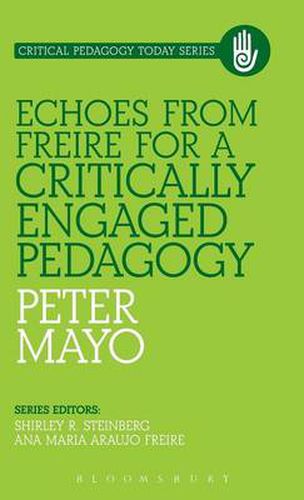Readings Newsletter
Become a Readings Member to make your shopping experience even easier.
Sign in or sign up for free!
You’re not far away from qualifying for FREE standard shipping within Australia
You’ve qualified for FREE standard shipping within Australia
The cart is loading…






In this concise and accessible text, Peter Mayo outlines some of the major concepts in Freire’s praxis. In pursuit of a critically engaging pedagogy, Mayo compares Freire’s work with a range of other thinkers and educators, including Lorenzo Milani, Antonia Darder, John Dewey, Margaret Ledwith, Antonio Gramsci, and Henry Giroux.
Chapters in the book include discussions of the State’s role in education - specifically higher education; a critical analysis of the dominant discourse in education centering on ‘competences’ and the type of slant this discourse takes; a study of adult education through a Freirean lens; an historical view of Nicaragua’s Freire-inspired literacy and popular education campaigns of 1980; a fresh perspective on the role of social movements in the contexts of social transformation; a new analysis of the relevance of Freirean concepts for transformative research, and an exploration of educators as intellectuals and social actors.
The result is a compelling study of how Paulo Freire’s writings continue to resonate around the world, and of how we must continue to apply and interpret them anew.
$9.00 standard shipping within Australia
FREE standard shipping within Australia for orders over $100.00
Express & International shipping calculated at checkout
Stock availability can be subject to change without notice. We recommend calling the shop or contacting our online team to check availability of low stock items. Please see our Shopping Online page for more details.
In this concise and accessible text, Peter Mayo outlines some of the major concepts in Freire’s praxis. In pursuit of a critically engaging pedagogy, Mayo compares Freire’s work with a range of other thinkers and educators, including Lorenzo Milani, Antonia Darder, John Dewey, Margaret Ledwith, Antonio Gramsci, and Henry Giroux.
Chapters in the book include discussions of the State’s role in education - specifically higher education; a critical analysis of the dominant discourse in education centering on ‘competences’ and the type of slant this discourse takes; a study of adult education through a Freirean lens; an historical view of Nicaragua’s Freire-inspired literacy and popular education campaigns of 1980; a fresh perspective on the role of social movements in the contexts of social transformation; a new analysis of the relevance of Freirean concepts for transformative research, and an exploration of educators as intellectuals and social actors.
The result is a compelling study of how Paulo Freire’s writings continue to resonate around the world, and of how we must continue to apply and interpret them anew.